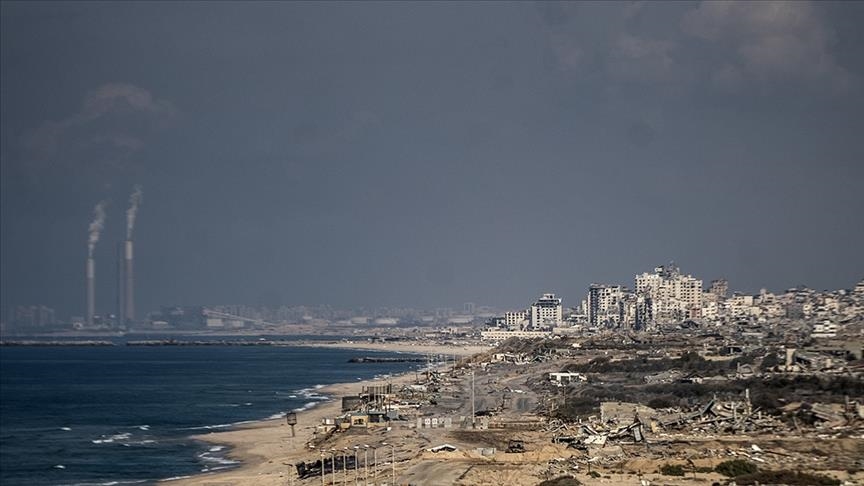OPINION - E1 project as a gateway to annexation: A decisive test for international law
E1 project is no longer a hypothetical plan but an unfolding measure. This reality constitutes a decisive test for the international community’s seriousness in upholding international law and the 2-state solution

- Israel is advancing its E1 plan to render it impossible for Palestine to form a state and to exclude East Jerusalem as its capital. This puts legality at odds with reality: Binding norms are systematically undermined while international resolutions remain unenforced
Mutaz M. Qafisheh is a professor of international law and diplomacy at Hebron University, Palestine, and Mazen Zaro is an independent international law researcher.
ISTANBUL
This Sept. 11, Israeli Prime Minister Benjamin Netanyahu signed the official approval for a settlement expansion plan in the E1 area, located between East Jerusalem and the settlement of 1Ma’ale Adumim1 in the central West Bank in occupied Palestine. The plan includes the construction of approximately 3,400 housing units. Israel considers this move the de facto beginning of its virtual annexation of the entire West Bank, after the project has been frozen for years due to international pressure. Netanyahu declared that “there will be no Palestinian state,” giving the project a declarative character in which settlements become a political tool to sever the possibility of Palestinian statehood rather than mere residential construction.
Then on Sept. 12, the UN General Assembly overwhelmingly adopted (142-10, with 12 abstentions) the New York Declaration that calls for concrete, time-bound, and irreversible steps toward establishing an independent Palestinian state. The resolution emphasizes the illegality of settlements and the urgent need to end the occupation as part of a two-state solution. Such a vote represents a growing recognition of Palestine's legitimacy while the expansion of settlements poses existential threats to this trajectory.
Strategic danger of the E1 project
The E1 project is not simply a plan to build houses for Israeli illegal settlers. It is part of a broader strategy to entrench Israeli control over Jerusalem. The plan isolates East Jerusalem from its Palestinian surroundings and cuts off the northern West Bank from its south, rendering any future Palestinian entity into fragmented cantons lacking the elements of an integral and viable state.
According to international law, the project constitutes an explicit breach of the principles of territorial integrity and the right to self-determination, both enshrined in the UN Charter and reaffirmed by Security Council Resolution 2334 (2016), which states clearly that “no Israeli settlement in the Palestinian territory occupied since 1967 has legal validity.” Israel’s attempt to impose permanent territorial facts by force can only be viewed as an illicit act of aggression that contravenes the principle of the inadmissibility of acquiring territory through force. That runs counter to the July 19, 2024 International Court of Justice verdict that instructed Israel to terminate its illegal occupation.
Growing international recognition of Palestine
Recently, waves of official recognition of Palestine have grown steadily, including from major states such as the UK and France. The New York Declaration represents the culmination of this process, with nearly three-quarters of UN member states supporting Palestine's statehood.
This growing recognition provides Palestine with stronger legal and diplomatic legitimacy, enhancing its standing in international institutions such as the UN, the International Court of Justice, the International Criminal Court, and specialized agencies. The more states recognize Palestine, the harder it becomes for Israel to ignore Palestinian rights. Yet recognition alone is insufficient if the material foundations of statehood (contiguous territory, natural resources, freedom of movement, and East Jerusalem as a capital) remain undermined by occupation and settlement policies.
Paradox of statehood recognition and settlement expansion
Here lies the central paradox: Whereas the international community reaffirms support for a two-state solution through declarations and statements, Israel is advancing its E1 plan to render it virtually impossible for Palestine to form an effective state and to exclude East Jerusalem as its capital. This puts legality at odds with reality: Binding norms are systematically undermined while international resolutions remain unenforced. The continued expansion of settlements amounts to a grave breach of international law and undermines the credibility of diplomatic initiatives.
This contradiction must be reconciled through a combination of measures. International accountability needs to be accelerated by precisely sanctioning the construction of settlements by the International Criminal Court. States should combine recognition with action through transforming the statehood ideal into tangible backing to Palestine’s territorial integrity. Diplomatic, military, and economic pressure should be intensified, by not only adopting symbolic stands like labeling settlement products and visa bans on far-right Israeli Cabinet ministers, but also imposing a full boycott on Israel as a state, a complete arm and aviation embargo as well as full economic sanctions, and preventing the travel of all Israeli officials, including ambassadors and diplomatic staff. Lastly, states should strengthen Palestinian institutions, the resilience of local communities, and mobilize global civil society to rescue the statehood project.
The E1 project is no longer a hypothetical plan but an unfolding measure. This reality constitutes a decisive test for the international community’s seriousness in upholding international law and the two-state solution. The New York Declaration may be significant, but without concrete judicial, diplomatic, economic, and even military measures, it will merely replicate the previous symbolic moves. Palestinian control over the E1 should be rescued before it becomes a gateway for annexation.
*Opinions expressed in this article are the authors' own and do not necessarily reflect Anadolu's editorial policy.








